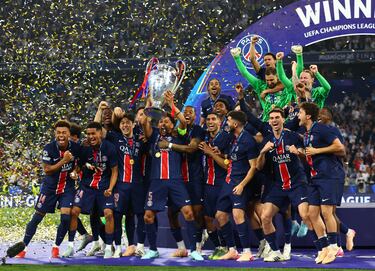UEFA’s Marchetti: “The new Champions League format has injected the ‘spice’ back into the competition
Last season saw UEFA embark on a new “Swiss model” 36-team league format for the Champions League and other European club competitions.


The 2024/25 season saw a dramatic change for UEFA club competitions as they governing body saw a shift in format from the traditional group stage to a ‘Swiss model’ 36 team league format across the Champions, Europa and Conference League competitions.
Many feel the change was a response from UEFA to the threat posed by the proposed breakaway ‘Super League’ and the offer of more games was a manner of placating bigger clubs.
After one season, the overall response to the new UEFA Champions League format, has been mixed, with both praise for increased excitement and criticism regarding the crowded fixture list and complexity.

Marchetti on new format change
UEFA deputy secretary general, Giorgio Marchetti was one of main keynote speakers at the third day of the 2025 Portugal Football Summit with the Italian offering key takeaways behind the decision to amend the old format after 21 years.
Speaking at Oeiras, the 65-year-old claimed: “This decision to move to a new format was done on a series number of grounds after lengthy discussion with stakeholders and especially the clubs”
“Our key objectives were: more equity, inclusivity which saw smaller nations offering participating clubs and a variety of opponents, more balance and unpredictability and we wanted a more dynamic and diverse competition featuring more top clases across all stages of the competition”.
He added: “Nothing can stay static forever and we needed to think about a new generation of fans and we now have a hybrid featuring both a league or group element plus the thrill of a knockout procedure”.
He continued: “There is no science behind this and we simply wanted a better football competition with the focus on the fans. We also wanted to avoid a scenario which avoided a repeat of fixtures with the new format now seeing teams play eight different teams rather than three home and away in the old group stage.
There were detractors who claimed the new format wasn’t fair but in the old format certain clubs faced a gap due to the coefficient ranking. The new format means that this average coefficient gap is now just 11 points".
Improved quality
Marchetti also maintained that each matchday now delivers many high profile clashes and no team can now take games for granted given the new format. This new configuration also throws up the ‘spice’ of uncertainty which is essential in any sporting realm.
“The new format offers more dynamism and offers ups and downs as teams move through the 32 team table which leads to a massive climax on matchday 8 as teams strive to secure a top 8 or top 24 placing when stakes are at their highest.

Going into this last kick-off time synchronised matchday eight, 25 of the 32 clubs had something to play for and we saw this last season where clubs were looking to other games to see if they had progressed to the next stage".
Positive feedback
Although the shift in format was not without its detractors who claimed that more games contribute to an already congested calendar and that additional matches does not necessarily translate to more quality, the Italian was adamant that the change has been an immediate success.
“The new format has been an evolution that has paid off and of course we had plenty of sleepless nights and believe me and we were anxious as to how the changes would be received. But the feedback, even from the media has been extremely positive”.
Related stories
Get your game on! Whether you’re into NFL touchdowns, NBA buzzer-beaters, world-class soccer goals, or MLB home runs, our app has it all.
Dive into live coverage, expert insights, breaking news, exclusive videos, and more – plus, stay updated on the latest in current affairs and entertainment. Download now for all-access coverage, right at your fingertips – anytime, anywhere.
Complete your personal details to comment